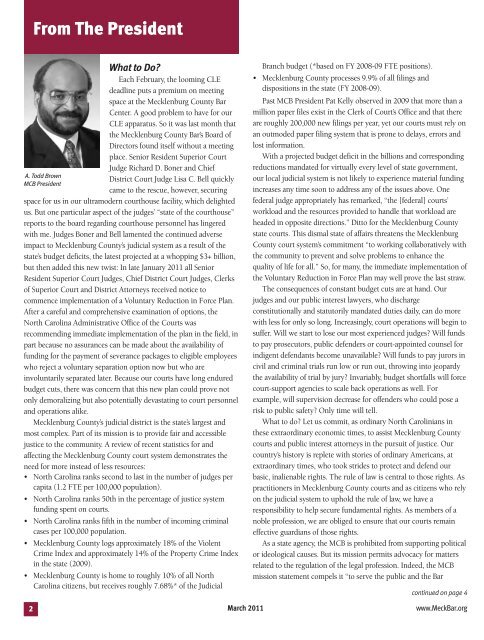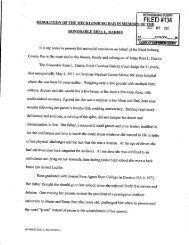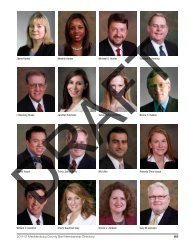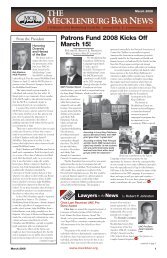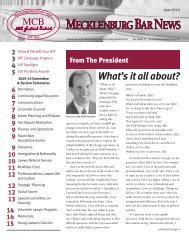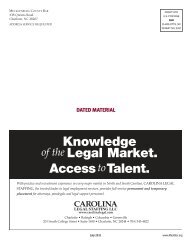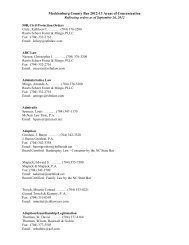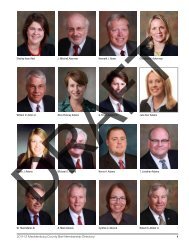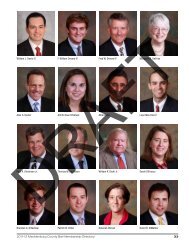Mar., 2011 - Mecklenburg County Bar
Mar., 2011 - Mecklenburg County Bar
Mar., 2011 - Mecklenburg County Bar
Create successful ePaper yourself
Turn your PDF publications into a flip-book with our unique Google optimized e-Paper software.
From The President<br />
A. Todd Brown<br />
MCB President<br />
What to Do?<br />
Each February, the looming CLE<br />
deadline puts a premium on meeting<br />
space at the <strong>Mecklenburg</strong> <strong>County</strong> <strong>Bar</strong><br />
Center. A good problem to have for our<br />
CLE apparatus. So it was last month that<br />
the <strong>Mecklenburg</strong> <strong>County</strong> <strong>Bar</strong>’s Board of<br />
Directors found itself without a meeting<br />
place. Senior Resident Superior Court<br />
Judge Richard D. Boner and Chief<br />
District Court Judge Lisa C. Bell quickly<br />
came to the rescue, however, securing<br />
space for us in our ultramodern courthouse facility, which delighted<br />
us. But one particular aspect of the judges’ “state of the courthouse”<br />
reports to the board regarding courthouse personnel has lingered<br />
with me. Judges Boner and Bell lamented the continued adverse<br />
impact to <strong>Mecklenburg</strong> <strong>County</strong>’s judicial system as a result of the<br />
state’s budget deficits, the latest projected at a whopping $3+ billion,<br />
but then added this new twist: In late January <strong>2011</strong> all Senior<br />
Resident Superior Court Judges, Chief District Court Judges, Clerks<br />
of Superior Court and District Attorneys received notice to<br />
commence implementation of a Voluntary Reduction in Force Plan.<br />
After a careful and comprehensive examination of options, the<br />
North Carolina Administrative Office of the Courts was<br />
recommending immediate implementation of the plan in the field, in<br />
part because no assurances can be made about the availability of<br />
funding for the payment of severance packages to eligible employees<br />
who reject a voluntary separation option now but who are<br />
involuntarily separated later. Because our courts have long endured<br />
budget cuts, there was concern that this new plan could prove not<br />
only demoralizing but also potentially devastating to court personnel<br />
and operations alike.<br />
<strong>Mecklenburg</strong> <strong>County</strong>’s judicial district is the state’s largest and<br />
most complex. Part of its mission is to provide fair and accessible<br />
justice to the community. A review of recent statistics for and<br />
affecting the <strong>Mecklenburg</strong> <strong>County</strong> court system demonstrates the<br />
need for more instead of less resources:<br />
• North Carolina ranks second to last in the number of judges per<br />
capita (1.2 FTE per 100,000 population).<br />
• North Carolina ranks 50th in the percentage of justice system<br />
funding spent on courts.<br />
• North Carolina ranks fifth in the number of incoming criminal<br />
cases per 100,000 population.<br />
• <strong>Mecklenburg</strong> <strong>County</strong> logs approximately 18% of the Violent<br />
Crime Index and approximately 14% of the Property Crime Index<br />
in the state (2009).<br />
• <strong>Mecklenburg</strong> <strong>County</strong> is home to roughly 10% of all North<br />
Carolina citizens, but receives roughly 7.68%* of the Judicial<br />
Branch budget (*based on FY 2008-09 FTE positions).<br />
• <strong>Mecklenburg</strong> <strong>County</strong> processes 9.9% of all filings and<br />
dispositions in the state (FY 2008-09).<br />
Past MCB President Pat Kelly observed in 2009 that more than a<br />
million paper files exist in the Clerk of Court’s Office and that there<br />
are roughly 200,000 new filings per year, yet our courts must rely on<br />
an outmoded paper filing system that is prone to delays, errors and<br />
lost information.<br />
With a projected budget deficit in the billions and corresponding<br />
reductions mandated for virtually every level of state government,<br />
our local judicial system is not likely to experience material funding<br />
increases any time soon to address any of the issues above. One<br />
federal judge appropriately has remarked, “the [federal] courts’<br />
workload and the resources provided to handle that workload are<br />
headed in opposite directions.” Ditto for the <strong>Mecklenburg</strong> <strong>County</strong><br />
state courts. This dismal state of affairs threatens the <strong>Mecklenburg</strong><br />
<strong>County</strong> court system’s commitment “to working collaboratively with<br />
the community to prevent and solve problems to enhance the<br />
quality of life for all.” So, for many, the immediate implementation of<br />
the Voluntary Reduction in Force Plan may well prove the last straw.<br />
The consequences of constant budget cuts are at hand. Our<br />
judges and our public interest lawyers, who discharge<br />
constitutionally and statutorily mandated duties daily, can do more<br />
with less for only so long. Increasingly, court operations will begin to<br />
suffer. Will we start to lose our most experienced judges? Will funds<br />
to pay prosecutors, public defenders or court-appointed counsel for<br />
indigent defendants become unavailable? Will funds to pay jurors in<br />
civil and criminal trials run low or run out, throwing into jeopardy<br />
the availability of trial by jury? Invariably, budget shortfalls will force<br />
court-support agencies to scale back operations as well. For<br />
example, will supervision decrease for offenders who could pose a<br />
risk to public safety? Only time will tell.<br />
What to do? Let us commit, as ordinary North Carolinians in<br />
these extraordinary economic times, to assist <strong>Mecklenburg</strong> <strong>County</strong><br />
courts and public interest attorneys in the pursuit of justice. Our<br />
country’s history is replete with stories of ordinary Americans, at<br />
extraordinary times, who took strides to protect and defend our<br />
basic, inalienable rights. The rule of law is central to those rights. As<br />
practitioners in <strong>Mecklenburg</strong> <strong>County</strong> courts and as citizens who rely<br />
on the judicial system to uphold the rule of law, we have a<br />
responsibility to help secure fundamental rights. As members of a<br />
noble profession, we are obliged to ensure that our courts remain<br />
effective guardians of those rights.<br />
As a state agency, the MCB is prohibited from supporting political<br />
or ideological causes. But its mission permits advocacy for matters<br />
related to the regulation of the legal profession. Indeed, the MCB<br />
mission statement compels it “to serve the public and the <strong>Bar</strong><br />
continued on page 4<br />
2 <strong>Mar</strong>ch <strong>2011</strong> www.Meck<strong>Bar</strong>.org


